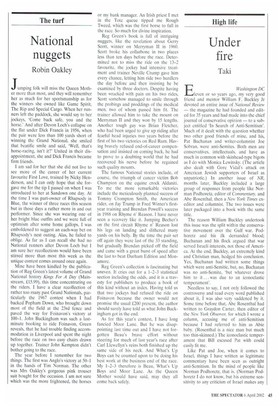National nuggets
Robin Oakley
Jumping folk will miss the Queen Mother more than most, and they will remember her as much for her sportsmanship as for the winners she owned like Game Spirit, The Rip and Special Cargo. When her runners left the paddock, she would say to her jockeys, 'Come back safe, you and the horse.' And after Devon Loch's collapse on the flat under Dick Francis in 1956, when the pair were less than 100 yards short of winning the Grand National, she smiled that beatific smile and said, 'Well, that's horse-racing, isn't it?' United in their disappointment, she and Dick Francis became firm friends.
I am sad for her that she did not live to see more of the career of her current favourite First Love, trained by Nicky Henderson, and I can only hope that she forgave me for the tip I passed on when I was introduced to her at Sandown one day. At the time I was part-owner of Rhapsody in Blue, the winner of three races this season but in those days a rather more in and out performer. Since she was wearing one of her bright blue outfits and we were full of optimism after some home gallops, I was emboldened to suggest an each-way bet on Rhapsody's next outing. Alas, he failed to oblige. As far as I can recall she had no National runners after Devon Loch but I am sure her recollections would have been stirred more than most this week as the unique contest comes around once again.
Mine have been kindled by the publication of Reg Green's latest volume of Grand National history Kings For A Day (Mainstream, £15.99), this time concentrating on the riders, I have a clear recollection of rather too many past Grand Nationals, particularly the 1967 contest when I had backed Popham Down, who brought down most of the field at the 23rd fence and paved the way for Foinavon's victory at 100-1. John Buckingham was such a lastminute booking to ride Foinavon, Green reveals, that he had trouble finding accommodation in Liverpool and spent the night before the race on two easy chairs drawn up together. Trainer John Kempton didn't bother going to the race.
The year before I remember for two things. The first was Anglo's victory at 50-1 in the hands of Tim Norman. The other was Mrs Oakley's gorgeous pink trouser suit bought for the occasion. I am not sure which was the more frightened, the horses or my bank manager. An Irish priest I met in the Tote queue tipped me Rough Tweed, which was the first horse to fall in the race. So much for divine inspiration.
Reg Green's book is full of intriguing nuggets, like the revelation about Gerry Scott, winner on Merryman II in 1960. Scott broke his collarbone in two places less than ten days before the race. Determined not to miss the ride on the 13-2 favourite, the jockey had intensive treatment and trainer Neville Crump gave him every chance, letting him ride two hurdlers the day before and then insisting he be examined by three doctors. Despite having been wracked with pain on his two rides, Scott somehow managed to smile through the probings and proddings of the medical men, two of whom passed him fit. The trainer allowed him to take the mount on Merryman II and they won by 15 lengths. Another tough guy was Brian Fletcher, who had been urged to give up riding after fearful head injuries two years before the first of his two victories on Red Rum. Having bravely refused end-of-career compensation and insisted on coming back, he had to prove to a doubting world that he had recovered his nerve before he regained such quality mounts.
The famous National stories include, of course, the triumph of cancer victim Bob Champion on the equine crock Aldaniti. To me the more remarkable victories include the meticulously planned success of Tommy Crompton Smith, the American rider, on Jay Trump in Fred Winter's firstyear training and Brendan Powell's success in 1988 on Rhyme n' Reason. I have never seen a recovery like it. Jumping Becher's on the first circuit Rhyme n' Reason lost his legs on landing and slithered many yards on his belly. By the time the pair set off again they were last of the 33 standing, but gradually Brendan picked off the field and came with a great burst of speed after the last to beat Durham Edition and Monamore.
Reg Green's collection is fascinating but uneven. It cries out for a 1-2-3 statistical section including the odds, and it is a travesty for publishers to produce a book of this kind without an index. Having told us that two jockeys had refused the ride on Foinavon because the owner would not promise the usual £200 present, the author should surely have told us what John Buckingham got in the end.
As for this year's contest, I have long fancied Moor Lane. But he was disappointing last time out and I have not forgotten Beau's brave effort without steering for much of last year's race after Carl Llewellyn's reins both finished up the same side of his neck. And What's Up Boys can be counted upon to be doing his best work at the business end of the race. My 1-2-3 therefore is Beau, What's Up Boys and Moor Lane. As the Queen Mother would have said, may they all come back safely.






























































 Previous page
Previous page